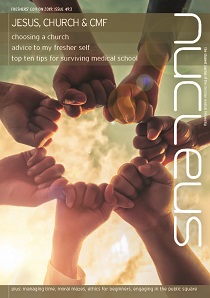can I sign my friend into lectures?
It's nine o'clock on a Monday morning and you're sitting, ready for the microbiology lecture to begin. You check your phone. Daniel has messaged saying he has slept in. He asks you to sign his name on the register — he'll repay the favour. Seems harmless — is it wrong?
Temptation to not tell the truth is surprisingly common at medical school: telling others what came up in OSCEs, signing people into lectures and making excuses to leave placement early. The GMC places a high value on integrity; you must make sure your conduct justifies your patients' trust in you and the public's trust in the profession, (1) and although these actions may seem harmless, they are ultimately untruthful. As Christians, we have even more reason to act with integrity.
God never lies; Jesus and the Holy Spirit are both referred to as The Truth. We should speak the truth because Scripture teaches us to. (2) Our conduct should adorn the gospel; we should speak the truth so that others know we can be trusted; (3) and, our lies can harm others. Not telling the truth has both worldly and spiritual consequences. As ambassadors for Christ, when we lie or intentionally mislead, we fail to promote the gospel or demonstrate integrity. There are also other areas to consider. Are we at risk of jeopardising a peer's education — or our own — when we constantly sign them in? Or missing a sign that someone is struggling?
How should we respond? Speaking the truth can be difficult. The Bible instructs us to 'speak the truth with love'. (4) Perhaps, when we decline to lie for our friends, we can offer to help with revision, share our notes from missed lectures, or talk to them about what is making it so hard for them to get out of bed.
We should speak the truth, being prepared to give a reason for the hope that we have. (5) Not cheating in exams or getting time out of lectures is very distinctive. This comes with great opportunity. Do we do these things because we find exams easy? Or because we are afraid of being caught out? No. Our actions are different because we have a greater hope, a hope in the Lord Jesus Christ, a God of truth, who is more concerned about our character than how many exams we pass.
do I have a responsibility to speak up if I see something that seems wrong?
Knowing when to speak up isn't straightforward. We may be less experienced than the person who appears to be doing something wrong, or not be quite sure what we are seeing. Exactly what needs to be done will vary considerably, depending on the situation, and involves both discussing with the person involved and finding the right person to escalate to if necessary. Perhaps we are concerned that a mistake will harm a patient, that a colleague is being treated unfairly, or that another doctor appears unwell. The Bible gives us some guiding principles as to why and how we should speak up. Jesus' greatest command, after loving God is to love our neighbour, and this should be our motivation to speak. When we speak up in the right situation, we can share the love of Christ.
How should we speak? These situations are usually complex and you generally won't know the full story. Matthew 18:15-16 refers to dealing with sin in Christian brothers and sisters, but the principle of addressing the individual first, before escalating to a senior, can be applied to these situations too. If we speak because of the love of Christ, then we should act also in his character. 'The fruit of the Spirit is love, joy, peace, forbearance, kindness, goodness, faithfulness, gentleness and self-control' (Galatians 5:22-23); reflecting on some of these qualities can help us when we plan to speak up:
- Gentleness: Ask first. There is often more to a situation than meets the eye. You may well be wrong or not fully understand the decision-making process. '…A harsh word stirs up anger' (Proverbs 15:1) whereas a gentle question may either avert an error or make you understand the decision better.
- Kindness: Show concern for individuals. It is important to be sensitive in how we ask and offer support.
- Self-control: Stay away from gossip. Perhaps you are concerned that your registrar has an alcohol problem. Maybe there is one doctor who everyone is talking about making mistakes and you have a fresh one to add. Resist the temptation to join in, but instead identify your medical school's mechanisms to escalate this where appropriate.
church weekend away or exam revision?
Time management is difficult for all medical students. As Christians, fellowship with our church family is biblical and important. We also have a responsibility to study hard so that we can give the best clinical care to our patients.
It's not true that Christians should always go to every church event because then God will make them pass their exams; Scripture encourages us to work with all our hearts whatever we do. We are to do this as though working for the Lord, (6) and it can be tempting to instead end up working for ourselves. God has laid out good works for each of us to do. (7) The question is, what is this work?
Jesus said, 'Love the Lord your God with all your heart and all your soul and with all your mind. This is the first and greatest commandment. And the second is like it: love your neighbour as yourself. All the Law and the Prophets hang on these two commandments'. (Matthew 22:37-40) Throughout the whole of Scripture, we see a God who longs for his people to return to him, to walk with him and to know him more. This should be our priority. Jesus' actions reflect this, and even on the busiest of days he took time to pray. Exactly how we spend the rest of our day will vary. We all have different gifts from God, (8) and each of us is urged to use them well. Working for the Lord will sometimes mean an evening studying, sometimes talking with a friend or sometimes encouraging others on a church weekend away. Jesus placed a high priority on relationships — church family, friends, and our biological family shouldn't be forgotten when we move away from home. (9)
Practically speaking, there are probably areas where we can be more efficient. Using diaries and planning work in advance can help to balance priorities, and perhaps there is a candid friend who can look at this with you. It's also important to remember that you don't have to do everything: serving God is meant to be a joy and not a burden.
So how shall I spend this weekend? The answer will be different at different times, and that is okay. Loving God first doesn't necessarily mean attending every church event, just as working with all your heart doesn't mean coming top in every exam. Don't worry, (10) but trust him, pray about your time, and remember that he is gracious.
go and see the gallbladder in Bed 4?
Perhaps this dilemma is subtler, but it is a situation you'll come across again and again. The moral question is in how we think about patients. The surgeon who asks you to 'review the gallbladder in Bed 4' does not literally mean you should ignore the rest of the patient, and no doctor would seriously condone this. However, this is an attitude that it is all too easy to slip into when you go hunting for 'good cases' on the wards.
The GMC says that we should care for the whole person — physical, emotional and spiritual. (11) Furthermore, God did not create isolated gall bladders, he created whole people! John Stott helpfully captures this idea: 'God created man, who is my neighbour, a body-soul in community. Therefore, if we love our neighbour as God made him, we should inevitably be concerned for his total welfare.' (12) We can and should learn from patients and seeing a wide variety of pathology is important. But if we go remembering the whole person, this is not only good medical practice, but is distinctive to our colleagues and serves to promote God's values.
Rebecca Horton is an FY1 in Oxfordshire
































